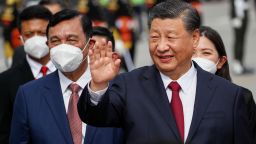Chinese leader Xi Jinping has stressed the need to reject confrontation in Asia, warning against the risk of cold war tensions, as leaders gather for the last of three world summits hosted in the region this month.
Xi began the Asia-Pacific Economic Cooperation (APEC) leaders’ summit in Bangkok by staking out his wish for China to be viewed as a driver of regional unity in a written speech released ahead of Friday’s opening day – which also appeared to make veiled jabs at the United States.
The Asia-Pacific region is “no one’s backyard” and should not become “an arena for big power contest,” Xi said in the statement, in which he also decried “any attempt to politicize and weaponize economic and trade relations.”
“No attempt to wage a new cold war will ever be allowed by the people or by our times,” he added in the remarks, which were addressed to business leaders meeting alongside the summit and did not name the US.
Xi struck a milder tone in a separate address to APEC leaders on Friday morning as the main event got underway, calling for stability, peace and the development of a “more just world order.”
Leaders and representatives from 21 economies on both sides of the Pacific are meeting in the Thai capital for the two-day summit to discuss how best to promote growth in the region, which sits on the fault lines of US-China competition and is grappling with regional tensions and the economic fallout of Russia’s war in Ukraine.
Ad Feedback
Those challenges were palpable Friday morning, as North Korea launched an intercontinental ballistic missile (ICBM), the second weapons test by Kim Jong Un’s regime in two days amid increased provocation from Pyongyang.
US Vice President Kamala Harris gathered on the sidelines of the summit with leaders from Japan, South Korea, Australia, New Zealand and Canada to condemn the launch in an unscheduled media briefing.
Tensions and diplomacy
In a speech Friday to business leaders, Harris said the US had a “profound stake” in the region, and described America as a “strong partner” to its economies and a “major engine of global growth.”
Without mentioning China in her address, she also promoted American initiatives to counter Beijing’s regional influence, including the Indo-Pacific Economic Framework, launched by Washington earlier this year, and the Partnership for Global Infrastructure and Investment.
“The US is here to stay,” said the vice president, who is representing the US at the summit after President Joe Biden returned home for a family event after attending meetings around the Association of Southeast Asian Nations (ASEAN) summit in Phnom Penh, Cambodia and the G20 summit in Bali, Indonesia in recent days.

US Vice President Kamala Harris addresses the APEC CEO Summit during the Asia-Pacific Economic Cooperation (APEC) Summit in Bangkok on November 18, 2022. Jack Taylor/AFP/Getty Images
Despite the US-China rivalry, the three summits have also brought opportunities to defuse rising tensions and strained communication between the world’s top two powers.
US-China relations have deteriorated sharply in recent years, with the two sides clashing over Taiwan, the war in Ukraine, North Korea, and the transfer of technology among other issues.
In August, following a visit by US House Speaker Nancy Pelosi to Taiwan, China fired multiple missiles into waters around the self-governing island and ramped up naval and warplane exercises in the surrounding area. Beijing claims the democratic island as its territory, despite never having controlled it, and suspended a number of dialogues with the US over the visit.
A landmark meeting between Xi and Biden on the sidelines of the G20 in Bali on Monday – the leaders’ first since Biden took office – ended with the two sides agreeing to bolster communication and collaborate on issues like climate and food security.
After landing in Bangkok Thursday, Chinese leader Xi sat down with Japanese Prime Minister Fumio Kishida, in the first meeting between leaders of the two Asian countries in nearly three years. Both sides called for more cooperation following a breakdown in communication over points of contention from Taiwan to disputed islands.
Seeking consensus
At stake in the broader meeting, however, is whether leaders can find consensus on how to treat Russia’s aggression in a concluding document, or whether differences in views between the broad grouping of nations will stymie such a result, despite months of discussion between APEC nations’ lower-level officials.
Leaders are expected to support a proposal based around a Thai government-backed initiative to promote sustainability, but the summit has faced some pushback in the country. Thai officers dispersed a crowd of protesters walking to the APEC summit venue on Friday, the police said in a statement.

With Biden and Putin absent from APEC, China’s Xi takes center stage
Protest organizer Patsaravalee Tanakitvibulpon said in a Facebook post the police had used force, including firing rubber bullets, to stop those demonstrating against the summit.
And whether leaders will come together on a further statement addressing the global economic situation remains to be seen as of Friday.
In an address to business leaders alongside the summit Friday morning, French President Emmanuel Macron, who was invited by host country Thailand, called for consensus and unity against Moscow’s aggression.
“Help us to convey the same message to Russia: stop the war, respect the international order and come back to the table,” he said.
Macron also called out the US-China rivalry, warning of the risk to peace if countries are forced to choose between the two great powers.
“We need a single global order,” Macron said to applause from business leaders.
Source : CNN
